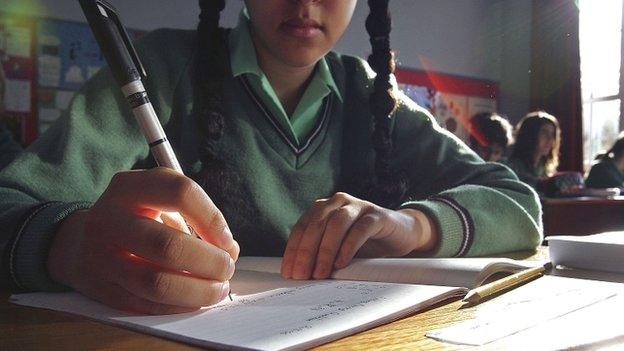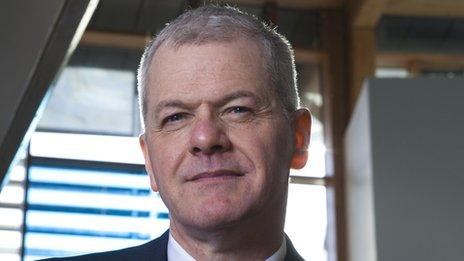School reforms: OECD calls for evidence on what works
- Published

Reforms are too often more about political announcements than the classroom outcome, says the OECD
Trillions of dollars are spent on education reforms around the world without any effective evaluation to see if changes have worked, says the OECD.
The economic think-tank is warning there is too much political investment in announcing new policies, rather than checking on what they achieve.
Only about one in 10 education reforms launched since 2006 have been assessed for their impact, the OECD says.
The report was launched at the Education World Forum in London.
This international conference of education ministers and experts was told that schools policy needed more emphasis on long-term evidence rather than short-term, politically driven changes of direction.
Time to work
"Too many education reforms are failing to measure success or failure in the classroom," said Andreas Schleicher, the OECD's director for education and skills.
"While it is encouraging to see a greater focus on outcomes, rather than simply increasing spending, it's crucial that reforms are given the time to work and their impact is analysed."

Only about a tenth of education reforms are ever evaluated, says the OECD
Education is one of the biggest areas of public spending - and across the OECD it represents more than $2.5 trillion in annual expenditure.
Pressure to raise standards has prompted 450 different programmes of reform in the past eight years, says the OECD.
But only about a tenth of these reform programmes have ever been tested for their effectiveness since they were launched, says the think-tank's report.
Implementation of education reforms can take 10 to 15 years, says Mr Schleicher, much longer than is demanded by the political cycle.
It can mean that incoming ministers are under pressure to announce new policies without any clear assessment of the half-completed previous policies they are replacing.
"This valuable investment must be deployed in the most effective way. Reforms on paper need to translate into better education in our schools and classrooms," says Mr Schleicher.
Last week the former head of English education watchdog Ofsted, Sir David Bell, warned that attempts to raise standards in England's schools were being undermined by political interference and short-term demands of party politics.
The OECD's overview of international patterns of reform shows common themes in many countries, such as helping disadvantaged children; improving vocational skills; raising the quality and training of teachers; and strengthening how schools are assessed and qualifications systems.
Another report being published by the OECD warns that a number of countries have too many uneducated young adults without any of the skills and qualifications needed for work.
Mr Schleicher said it was a "major risk" for countries including France, Italy and the Netherlands to have almost one in six people aged 25 to 34 lacking the basic skills for work.
"Progress has to be achieved across the educational ladder, with priority given to diminishing the share of the least educated among the young," he said.
John Bangs, chair of the OECD's trade union advisory committee working group on education said: "One of the contradictions of some democratic governments, particularly England, is that they feel they have to make their mark with reforms.
"It seems no new government of a different political persuasion wants to evaluate a previous government's reforms. The constant disruptive process of governments seeing reforms through a party political lens is massively damaging."
Kevin Courtney, deputy general secretary of the National Union of Teachers, said: "It is quite clear that endless changes to the education system are entirely unhelpful. Teachers are tired of policy change which often appears to be more about grabbing headlines than improving education for all students."
- Published9 January 2015
